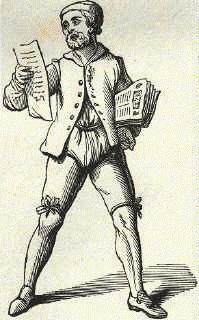The sharers
The senior members of the company were called "fellows*" or "sharers" because they shared in the company's profits; they also shared in its expenses* and were legally responsible for the company. Sharers selected plays for the company's repertoire and performed the principal roles, while all other members were their employees. Most London companies had eight to twelve sharers.
Some sharers, like Burbage and Kempe, were popular actors; others, like Shakespeare and Heminge, were better known for their other contributions. Membership carried a financial responsibility--sharers had to be able to purchase a share* and raise capital. They also had to be active members of the company--when a sharer left, his share was bought out; if he died, the company would reimburse his widow and resell the share to another member of the company.
Footnotes
-
Shakespeare and his fellows
Shakespeare remembered some of his "fellowes" in his will.
-
Company expenses
Company expenses included rent, costumes and props, wages, and fees to the Office of the Revels.
